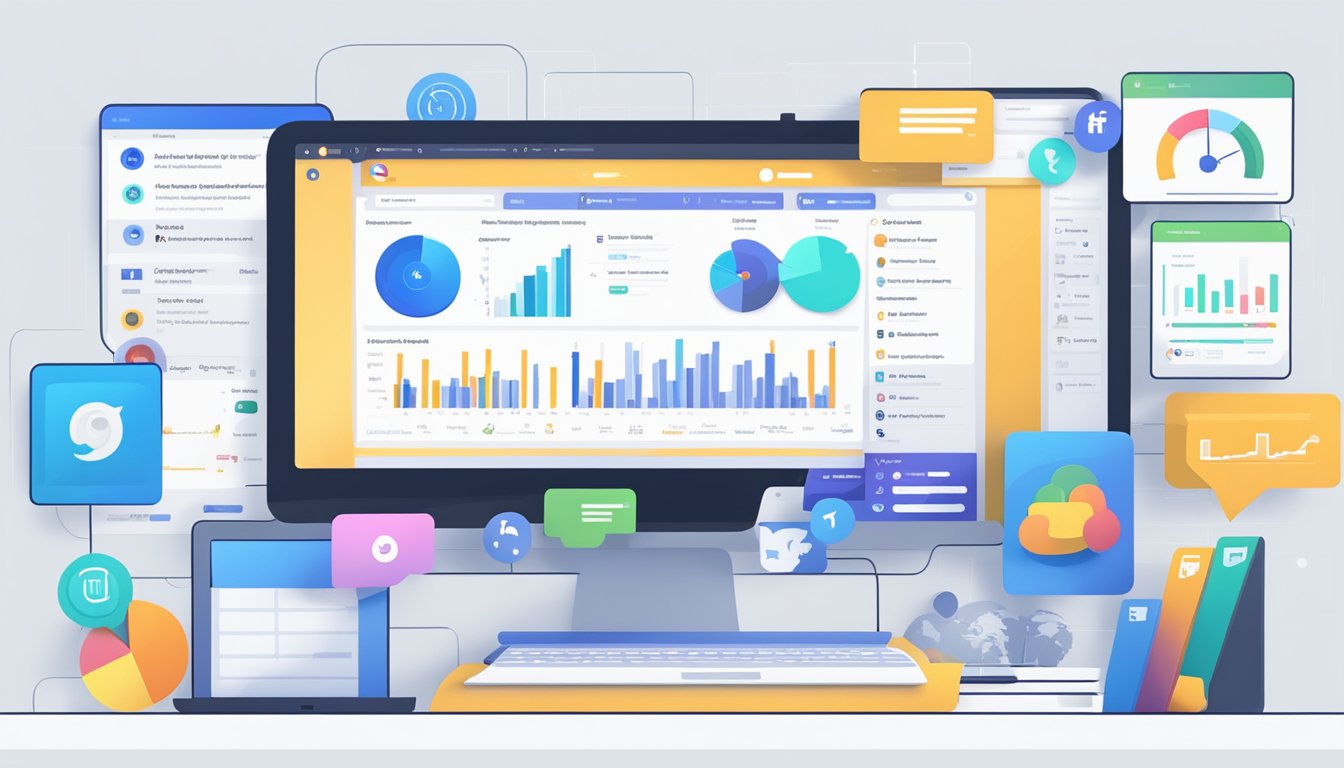In the ever-evolving landscape of digital marketing, social media management software has become an indispensable tool for businesses, organizations, and individual influencers. This technology is designed to streamline the process of managing multiple social media accounts, schedule posts, analyze performance metrics, and engage with audiences across various platforms. The efficiency of these tools allows users to maintain a strong online presence, ensuring that their digital marketing strategies are executed seamlessly.

Social media management software addresses the challenges associated with managing online content and interactions by providing a centralized register for users to monitor and control their various accounts. From a single dashboard, users can track conversations, measure engagement, and respond to comments or inquiries in a timely fashion. By harnessing the power of these tools, businesses can optimize their outreach and tailor their social media campaigns to target audiences more effectively.
Choosing the right social media management software requires an understanding of each platform’s unique features, scalability, and integration capabilities with other marketing tools. It is important for users to assess their specific needs, ranging from user-friendliness for smaller operations to more advanced functionalities for larger organizations with diverse social media strategies. With an array of options available, selecting the correct software can significantly enhance a brand’s online interaction and marketing performance.
Overview of Social Media Management Software

Social media management software is a tool that assists businesses and individuals in streamlining their social media presence across multiple platforms. These tools offer a variety of functions to increase efficiency and aid in tracking performance.
- Scheduling and Publishing: Users can schedule posts to be published at specific times and dates. This ensures consistent online presence and frees up time to focus on other tasks.
- Analytics: They provide analytics to evaluate performance metrics such as engagement rates, follower growth, and reach.
- Engagement: Features enable users to manage interactions with their audience by consolidating messages and comments from multiple channels into a single interface.
- Collaboration: Teams can collaborate easily with role assignments and workflows that ensure efficient management of social media tasks.
| Key Feature | Function |
|---|---|
| Content Calendar | Visual schedule of planned posts. |
| Social Listening | Monitoring social media for mentions and relevant keywords. |
| Multi-Account Handling | Managing multiple social profiles from one dashboard. |
| Reporting | Generating reports on key metrics and ROI. |
Companies use these tools to maintain a cohesive strategy across various social networks, respond promptly to their audience, and gain insights into their social media campaigns’ impact. This can lead to a more deliberate and impactful online presence.
Key Features to Register

When selecting social media management software, organizations should consider several key features that will streamline their online presence.
- Content Scheduling: Users need to be able to schedule posts in advance to maintain a consistent social media presence.
- Analytics and Reporting: Detailed analytics help users understand their audience engagement and the performance of their content.
- Multi-Platform Integration: The software should offer integration with multiple social media platforms for centralized management.
- User Collaboration Tools: Features for team collaboration, such as shared content calendars and approval workflows, are essential.
- Customer Engagement: The software must include tools for monitoring and managing interactions with the audience.
| Feature | Description |
|---|---|
| Content Scheduling | Plan and arrange posts across different platforms in advance. |
| Analytics and Reporting | Access to data on post performance, audience demographics, and engagement levels. |
| Multi-Platform Integration | Manage several social media accounts from a single dashboard. |
| User Collaboration Tools | Work with others seamlessly and manage approval processes. |
| Customer Engagement | Tools for responding to customers and tracking conversations. |
These features contribute to a robust system that can save time, inform strategic decisions, and foster team collaboration. Companies must assess their needs and ensure they choose a platform that aligns with their business objectives and social media strategy.
Comparing Top Platforms

Social media management software is critical for efficient online engagement. Each platform offers distinct features suitable for different business needs. Three leading platforms are Hootsuite, Buffer, and Sprout Social.
Hootsuite allows users to schedule posts, track social media traffic, and manage multiple accounts across various social networks. It emphasizes comprehensive analytics and integrates with over 35 social networks.
- Pros: Extensive integrations, in-depth analytics
- Cons: Can be overwhelming for beginners
Buffer focuses on simplicity and usability, offering intuitive post scheduling, insights on post performance, and an easy-to-use interface.
- Pros: User-friendly, streamlined design
- Cons: Limited advanced features
Sprout Social provides robust tools for engagement, publishing, analytics, and team collaboration. It stands out with its CRM features that allow tracking of conversations and customer relationships.
- Pros: CRM capabilities, collaborative tools
- Cons: Higher cost
| Feature | Hootsuite | Buffer | Sprout Social |
|---|---|---|---|
| Post Scheduling | Yes | Yes | Yes |
| Analytics | Comprehensive | Basic | Detailed |
| Interface | Complex | Simple | Intuitive |
| Integrations | 35+ social networks | Limited | Several key networks |
| CRM Features | No | No | Yes |
| Cost | Varies with plan | Generally affordable | Tends to be more expensive |
| User Suitability | Social media experts | Beginners and small teams | Large businesses/enterprises |
Selecting the right platform depends on an organization’s specific needs, including the level of social media activity, budget constraints, and the desired balance between functionality and simplicity.
Implementation Strategies

When an organization elects to integrate social media management software, developing a thorough plan is essential for a smooth transition.
1. Assessing Needs and Resources
Before selecting software, a company should evaluate its social media goals and the resources available. A detailed needs assessment will help in choosing the right software.
- Current Platform Use: List platforms currently in use.
- Feature Requirements: Identify essential features needed.
- Team Skills: Gauge the team’s proficiency with social media tools.
2. Choosing the Right Software
Comparison of features against the company’s requirements is crucial. Priority should be given to software that offers:
- Intuitive interface
- Robust analytics
- Customer support
3. Training Staff Effective training ensures team members are proficient with the new tools.
- Schedule training sessions
- Provide resources and documentation
- Encourage practice in a sandbox environment
4. Data Migration and Integration
Migrating data from old systems should be handled with care to avoid loss of information.
- Back up existing data
- Use the software’s import tools
- Ensure proper integration with other workplace systems
5. Test and Iterate
Pilot the software with a small team before a full roll-out to detect any issues.
- Monitor software performance
- Gather feedback from pilot users
- Make necessary adjustments before wider implementation
To ensure successful implementation, regular evaluations of software usage and success metrics should be conducted. This will help to measure the return on investment and adjust strategies as needed.
Legal and Compliance Considerations

When selecting a social media management software, it’s critical to prioritize legal and compliance issues to protect an organization’s interests. This includes respecting data protection laws, such as the General Data Protection Regulation (GDPR) in the European Union or the California Consumer Privacy Act (CCPA) in the United States.
Data Protection and Privacy
- Data Storage: Verify where data is stored and if it complies with local laws.
- User Consent: Ensure mechanisms for obtaining user consent for data collection are in place.
- Data Access: Control who has access to sensitive data within the organization.
Intellectual Property
- Use the software to monitor and protect intellectual property rights.
- Avoid unauthorized use of copyrighted materials.
Record Keeping
- Audit Trails: Maintain logs of social media interactions for accountability.
- Archiving: Implement policies to archive communications in compliance with industry regulations.
Terms of Service Compliance
- Understand the terms of service of each social media platform.
- Ensure that the software does not perform actions that violate these terms.
Organizations must also keep abreast of changes in social media regulations and ensure their management software can adapt to new requirements. In addition, there may be industry-specific regulations, such as FINRA in the financial sector, which necessitate additional compliance measures. It is paramount for companies to consult with legal experts to navigate the complexities of social media law and ensure their practices are legally sound.
Future Trends in Social Media Management

Artificial Intelligence and Automation: Social media management tools are expected to integrate more advanced AI algorithms. These technologies will facilitate predictive analytics, suggesting optimal posting times and content types tailored to audience preferences. Automation will further streamline content scheduling and customer interactions.
Enhanced Personalization: Personalization will evolve beyond basic demographic targeting. Future tools will utilize machine learning to craft highly individualized experiences for users, interacting with them based on past behavior and preferences.
Social Commerce Integration: Platforms will likely introduce more sophisticated social commerce features. These will include seamless in-app purchasing capabilities, allowing users to buy products directly through social media ads and posts.
Advanced Analytics and Reporting: Social media management software may offer deeper analytics. Users will gain insights into the emotional reactions of their audiences and the performance of their campaigns at micro-levels. Expect more visual representations, such as heat maps and sentiment analysis graphs.
| Trend | Description |
|---|---|
| AI & Automation | More AI for predictive analytics and automated content scheduling. |
| Personalization | Deeper machine learning for individualized user interactions. |
| Social Commerce | Streamlined in-app purchasing and social commerce features. |
| Advanced Analytics & Reporting | Refined analytics for detailed campaign insights and visual data representations. |
Privacy and Compliance: As privacy concerns grow, social media management tools will adapt to ensure compliance with regulations like GDPR. Expect an emphasis on privacy-safe practices for data collection and targeting.
Multi-Channel Management: Users will likely manage an expanding range of social platforms from a single dashboard. This will include not only mainstream networks but also emerging and niche platforms appealing to diverse audience segments.
These trends indicate significant advancements in social media management software, making it more powerful and essential for effective digital strategy.
Case Studies on Software Adoption

Acme Corporation implemented Hootsuite to centralize their social media efforts. They observed a 30% increase in customer engagement within six months due to streamlined publishing and analytics features.
Sprout Social was adopted by Orion Marketing, resulting in a 50% reduction in response time to social inquiries. Employee productivity improved due to advanced message organization and task assignment capabilities.
Beehive Agency turned to Buffer for scheduling content across platforms, leading to consistent online presence and a 20% growth in their follower base. They also benefited from the tool’s intuitive analytics, which guided their content strategy.
Finally, Zephyr Enterprises chose CoSchedule for its ability to integrate with their existing marketing stack. They reported a 15% increase in social campaign ROI thanks to better alignment with overall marketing activities.
| Company | Software | Outcome |
|---|---|---|
| Acme Corporation | Hootsuite | 30% increase in engagement |
| Orion Marketing | Sprout Social | 50% reduction in response time |
| Beehive Agency | Buffer | 20% growth in followers |
| Zephyr Enterprises | CoSchedule | 15% increase in campaign ROI |
Tips for Maximizing Software Potential

Utilizing social media management software effectively requires understanding its capabilities and leveraging them for efficiency. Here are some strategies to maximize the potential of such software:
- Stay Organized: Utilize the software’s scheduling feature to plan content in advance. A consistent posting schedule maintains audience engagement.
- Monday: Share industry news.
- Wednesday: Post user-generated content.
- Friday: Highlight a weekly feature.
- Analyze Data: Pay close attention to the analytics provided by the software. Tracking performance metrics helps in fine-tuning strategies.
- Engagement Rate: Tailor content based on what resonates with the audience.
- Best Post Times: Schedule posts when the audience is most active.
- Collaborate Efficiently: Many software options offer collaboration tools.
- Assign roles and permissions, facilitating a better workflow among team members.
- Use shared content calendars for clear communication of plans and deadlines.
- Streamline Communication: Monitor and respond to messages and comments centrally, ensuring no customer feedback is overlooked.
- Leverage Automation: Implement chatbots where appropriate to respond to common inquiries, saving time for more complex customer service tasks.
Employing these tips can optimize the use of social media management software, thereby enhancing online presence and building stronger relationships with the audience.
